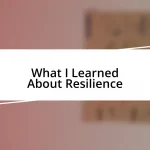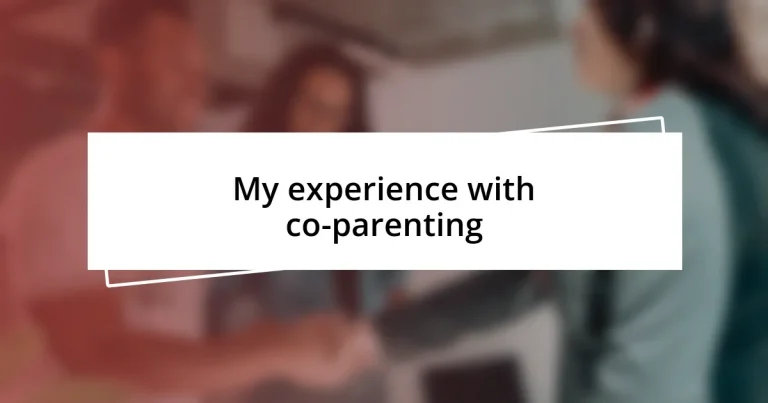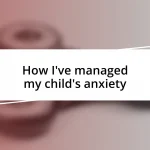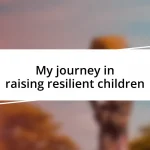Key takeaways:
- Effective communication is crucial in co-parenting; using “I” statements and staying solution-oriented can reduce misunderstandings.
- Creating a shared parenting plan fosters clarity and outlines individual responsibilities, enabling effective collaboration.
- Embracing empathy and checking in regularly with your co-parent strengthens the relationship and prioritizes the children’s well-being.
- Setting boundaries and being flexible in arrangements are essential for addressing the unpredictable nature of co-parenting.
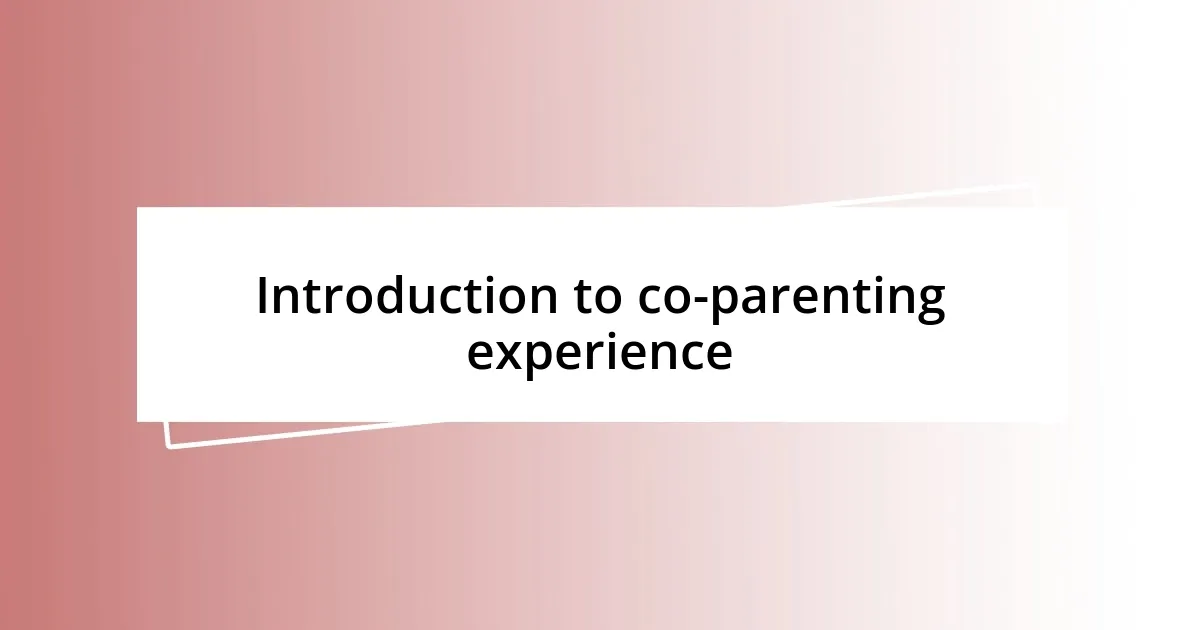
Introduction to co-parenting experience
Co-parenting is a journey that brings its own set of challenges and rewards. I remember the initial days after separating from my partner, feeling a whirlwind of emotions—fear, sadness, and even guilt washed over me. How do you navigate parenting when you’re no longer in the same home? It’s a question I grappled with deeply as I tried to create a stable environment for my kids amid the changes.
Over time, I learned that communication is the backbone of effective co-parenting. There were moments when I felt overwhelmed, especially during family gatherings or school events. I vividly recall a birthday party where tension hung in the air, and I wondered if we could both be present without it feeling awkward. Yet, those experiences taught me to focus on what truly mattered—the happiness of my children.
The partnership we forge in co-parenting can feel more like an emotional balancing act than a harmonious duet. I’ve found that celebrating the small victories together—like a successful school report—can transform the co-parenting relationship. But it makes me wonder, can we truly put aside our differences for the sake of our kids? For me, the answer lies in the profound love we have for our children, which often serves as a compass guiding us through the complexities of this relationship.
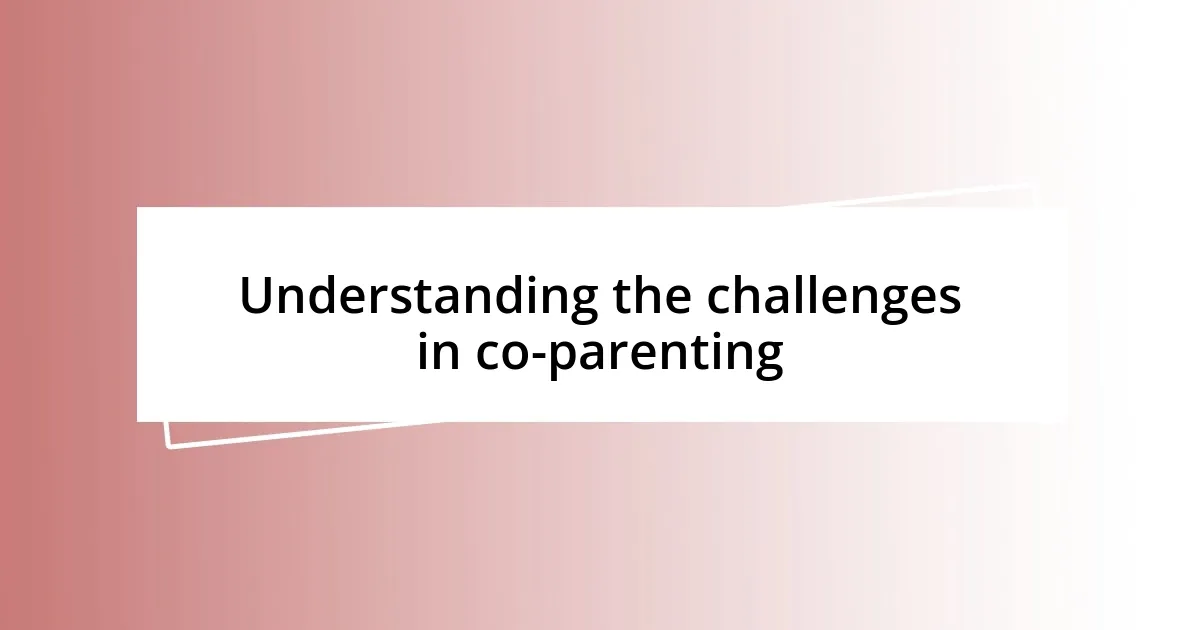
Understanding the challenges in co-parenting
The challenges in co-parenting are often unexpected. I remember vividly the first time I had to discuss important decisions with my ex-partner. The weight of necessary compromises felt heavy, and yet, we both knew our children’s well-being was at stake. It’s in these moments that misunderstandings can arise, leading to miscommunication. How often have we disagreed on what’s best for our kids? Quite frequently, actually—it’s a part of the journey.
Navigating schedules can also be a daunting task. I once found myself scrambling to arrange a last-minute pick-up when my ex was running late. The pressure to keep everything on track for the kids’ activities can intensify the stress. Just when you think you’ve got a handle on things, life throws in a curveball. I learned the importance of flexibility and patience, reminding myself that it was all part of the co-parenting plan.
One of the toughest aspects is the emotional rollercoaster. There are days when I feel like I’m thriving as a co-parent, and there are others when old resentments bubble to the surface. I can’t help but recall that feeling of recognition in my daughter’s eyes during a particularly challenging exchange with my ex—she was the silent witness to everything. In those moments, I realize that our actions directly impact our kids. Understanding the emotional toll we face is crucial in overcoming these hurdles together.
| Challenge | Example |
|---|---|
| Communication | Misunderstandings during co-parenting meetings |
| Scheduling | Juggling kids’ activities can create stress |
| Emotional Impact | Children aware of parental tensions |
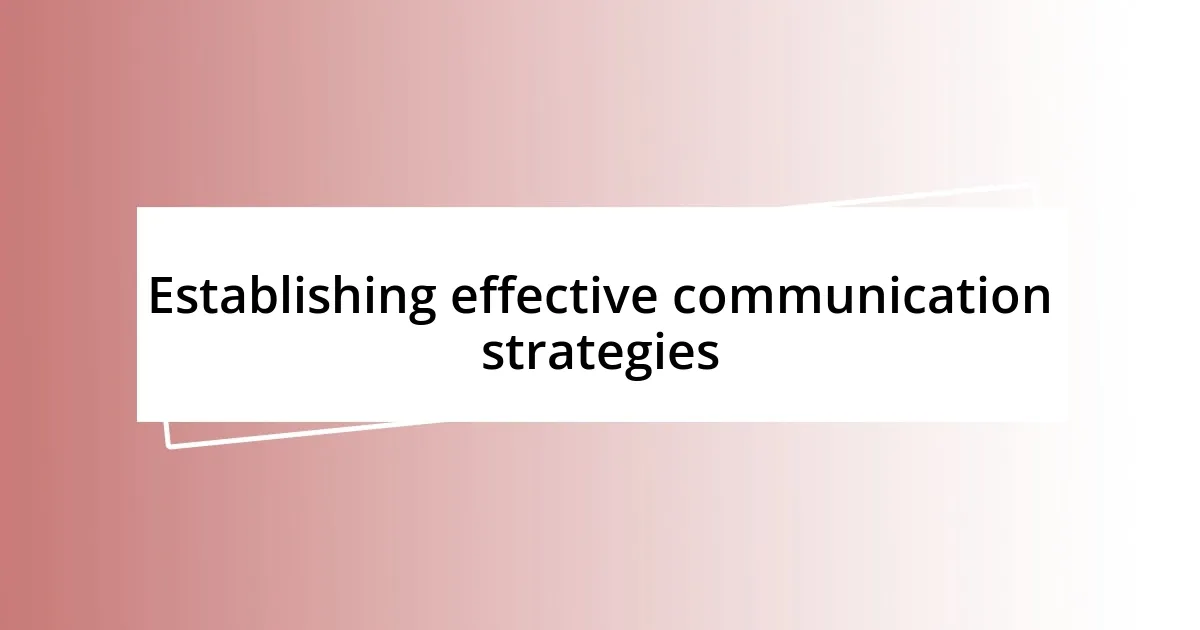
Establishing effective communication strategies
Effective communication strategies are essential in co-parenting. I’ve learned that clarity is key. Early on, I found myself frustrated during conversations about our kids, often leading to misunderstandings. One time, I blurted out my concerns without fully expressing the why behind them, which only heightened the tension. I’ve realized since then that taking a moment to gather my thoughts and clearly articulate my feelings makes all the difference.
To enhance communication, consider these strategies:
- Use “I” Statements: Express your feelings without placing blame. For example, “I feel overwhelmed when…” instead of “You always make it harder by…”
- Set Regular Check-ins: Schedule dedicated times to communicate about your children, ensuring you both stay on the same page.
- Stay Solution-Oriented: Focus on finding solutions rather than rehashing old grievances. My ex and I found it helpful to brainstorm together on challenges rather than getting bogged down in disagreements.
- Utilize Technology: Apps or shared calendars can be lifesavers for scheduling and updates. I remember the relief I felt when we started using a shared app to track the kids’ activities—it minimized last-minute chaos.
- Keep it Respectful: Maintain a calm tone, even when discussions get heated. I’ve discovered that a respectful demeanor often leads to more productive conversations.
Implementing these strategies has dramatically improved my co-parenting experience, transforming challenging conversations into collaborative discussions that truly prioritize our children’s needs.
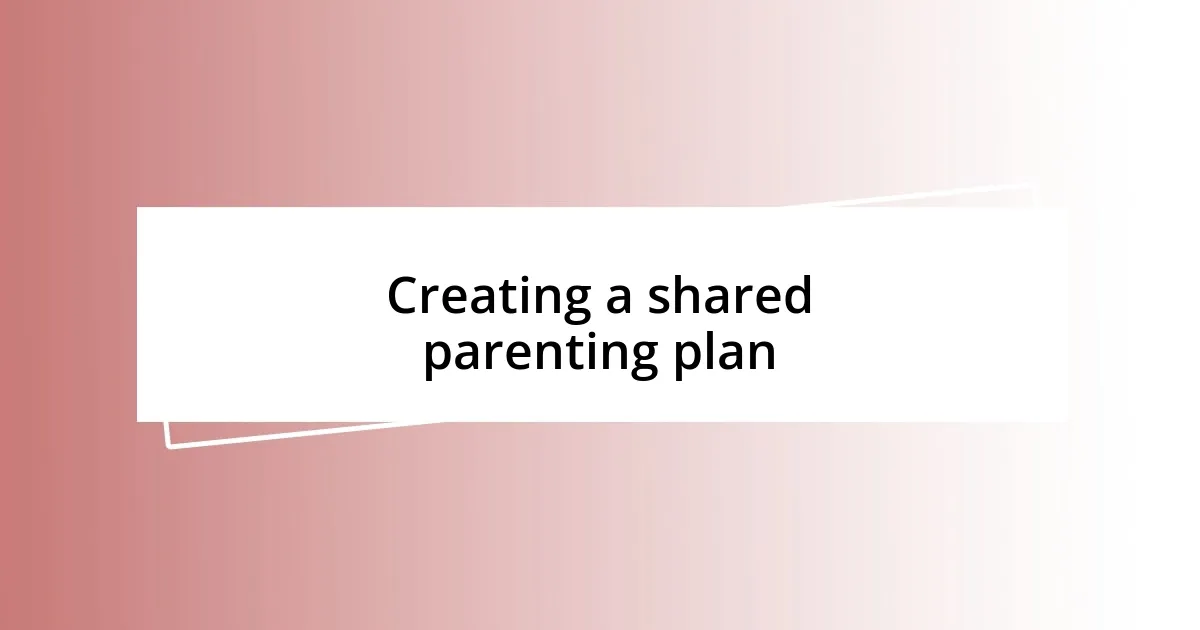
Creating a shared parenting plan
Creating a shared parenting plan has been a transformative experience for me, offering structure amid the unpredictability of co-parenting. I remember the first time I sat down to draft our plan with my ex—what initially felt overwhelming became a powerful tool for clarity. We both had our ideals of what parenting should look like, but collaborating helped us find common ground. How many times have we gotten lost in our own agendas? Establishing this plan forced us to put our children’s needs first, making the process feel less daunting.
We decided to break it down into manageable sections, covering everything from custody schedules to holiday arrangements. I can’t stress enough the importance of flexibility—life doesn’t always align with our carefully crafted plans. There was a time when an unexpected family event clashed with our original agreement, and instead of rigidly sticking to the plan, we communicated openly and adjusted our arrangements. This adaptability has often not only smoothed over potential conflicts but also reinforced our commitment to co-parenting effectively.
Another aspect I truly value in our shared parenting plan is the ability to outline our individual responsibilities. For instance, we agreed that I would handle the kids’ medical appointments, while my ex would manage their school activities. This division of roles didn’t just reduce confusion; it empowered us to take ownership of our responsibilities, fostering a sense of teamwork. Have you ever felt the weight of ‘who does what’ in co-parenting? By defining our roles, we’ve alleviated that burden and transformed disagreements into cooperative solutions, which ultimately reflects positively on our children.
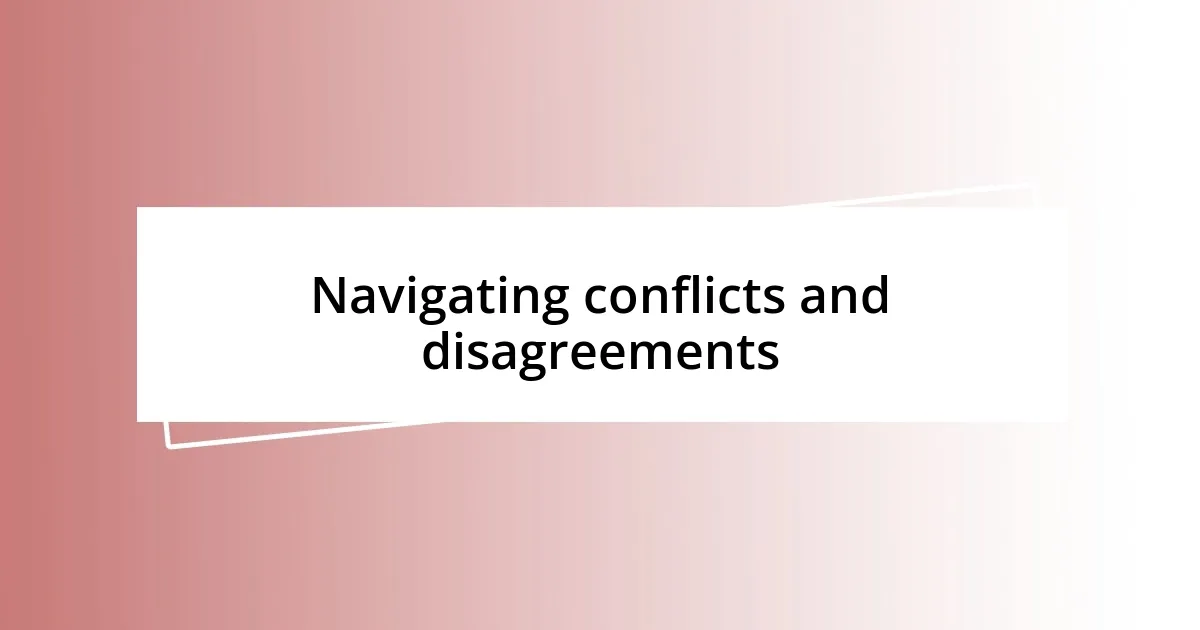
Navigating conflicts and disagreements
Navigating conflicts and disagreements in co-parenting is often like walking a tightrope. I recall a particularly heated argument where we disagreed on our child’s extracurricular activities. Instead of getting stuck in a blame game, I decided to focus on listening actively. This small shift allowed me to understand my ex’s perspective better, turning a potential standoff into a golden opportunity for compromise—something that, frankly, was new to me. Have you ever noticed how simply pausing to listen can diffuse a charged situation?
Another key aspect I’ve found is the importance of timing. When emotions are high, it’s wise to take a step back. For example, there was a moment when I was frustrated about a last-minute change to our parenting plan. Instead of reacting impulsively, I opted to wait a day to discuss it, which helped me articulate my feelings more clearly. This pause not only allowed me to express my concerns without the heat of the moment but also helped my ex approach the topic with a calmer mindset. Do you find that sometimes, taking a break can lead to better solutions?
Ultimately, embracing the understanding that we won’t always see eye to eye has been pivotal. I’ve learned to approach disagreements with curiosity rather than defensiveness. For instance, during one discussion, I asked my ex to explain the rationale behind a decision rather than dismissing it outright. This opened up a dialogue about our kids’ needs that might have otherwise turned into an argument. Have you ever had a moment where simply asking “Why?” changed the course of a conversation? It’s these little changes in perspective that have enriched my co-parenting journey in ways I hadn’t anticipated.
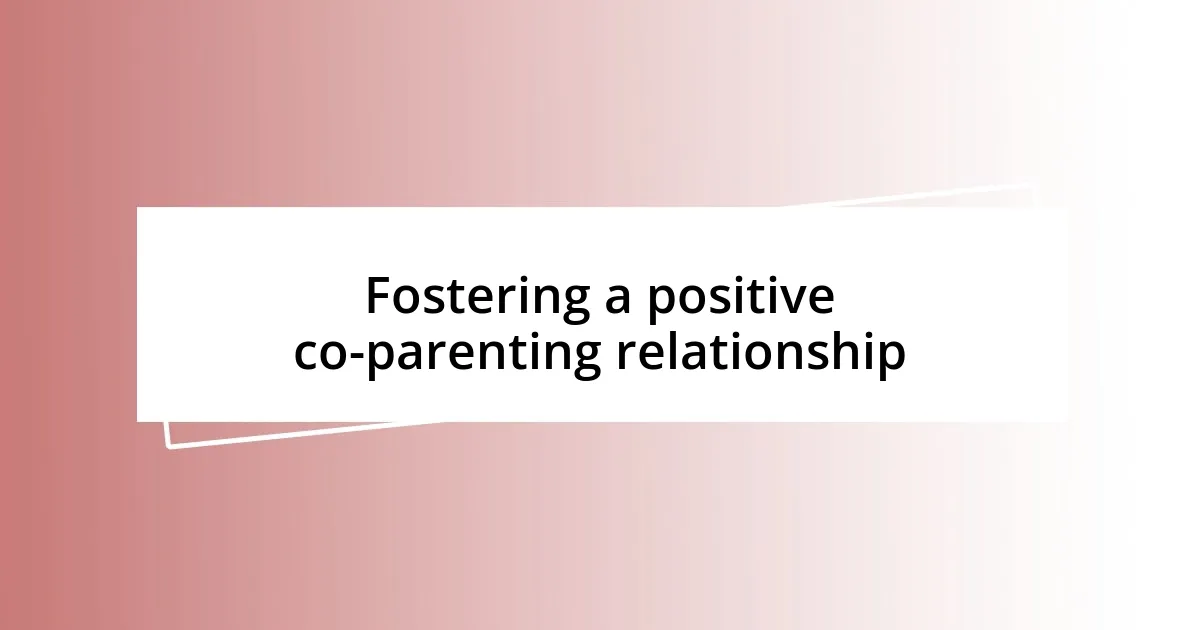
Fostering a positive co-parenting relationship
Establishing a positive co-parenting relationship requires consistent and respectful communication. I’ve found that simply checking in with my ex once a week to discuss our children’s progress has made a world of difference. It’s like having a friendly coffee chat; we update each other on what’s happening, celebrating the little victories and addressing concerns calmly. Have you ever noticed how small conversations can maintain a healthy connection, even in challenging situations?
Empathy plays a crucial role in fostering this relationship. I remember a time when my ex was struggling with a personal issue, and instead of reacting defensively to a change in our plans, I chose to be understanding. I sent a supportive message, letting them know I was there if they needed to talk. This gesture not only eased the immediate tension but reinforced the idea that we are in this together, prioritizing our children’s well-being. Have you experienced the power of empathy changing the dynamics in a tough situation?
Lastly, finding ways to celebrate our shared parenting wins has truly enhanced our collaboration. After a successful week of keeping to our schedule and managing the kids’ activities, my ex and I decided to give ourselves a small shout-out—just a text exchange sharing what went well. This acknowledgment creates a positive atmosphere and motivates us to work together, reminding us that we’re capable of creating a supportive environment for our kids. Isn’t it amazing how gratitude can transform the co-parenting landscape?
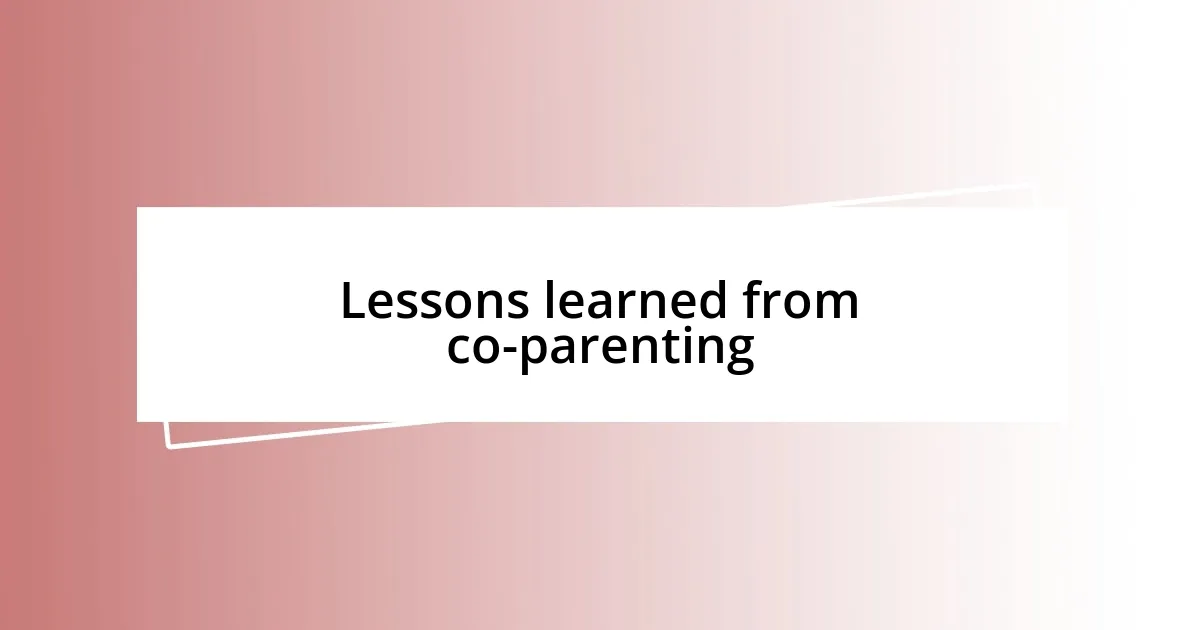
Lessons learned from co-parenting
Tackling the realities of co-parenting has been a journey filled with hidden lessons. One thing I learned is the significance of setting boundaries. Early on, I found myself overwhelmed when my ex would call unexpectedly to discuss our child. I gradually realized that by establishing specific times for these conversations, it allowed me to prepare mentally and emotionally, leading to more productive discussions. Have you ever felt the difference in clarity when setting aside dedicated time for important topics?
Another lesson I continue to learn is to embrace flexibility. Life throws curveballs, and co-parenting is no exception. I remember a situation where a planned family outing fell through due to unforeseen commitments; rather than sulking, I reached out to my ex and suggested an alternative day. The unexpected shift turned into an enriching experience as we discovered hidden gems to explore together. Isn’t it remarkable how those last-minute changes can sometimes lead to the most memorable moments?
Lastly, prioritizing our children’s feelings over any past grievances has been a game-changer. Just recently, my child expressed anxiety about an upcoming family event, feeling torn between both parents. I took a step back and realized it was essential to validate my child’s emotions rather than dismissing them as trivial. By addressing their concerns together with my ex, we were able to reassure our child, fostering a sense of unity. Isn’t it inspiring how focusing on our children’s well-being can dissolve old tensions and create lasting bonds?
